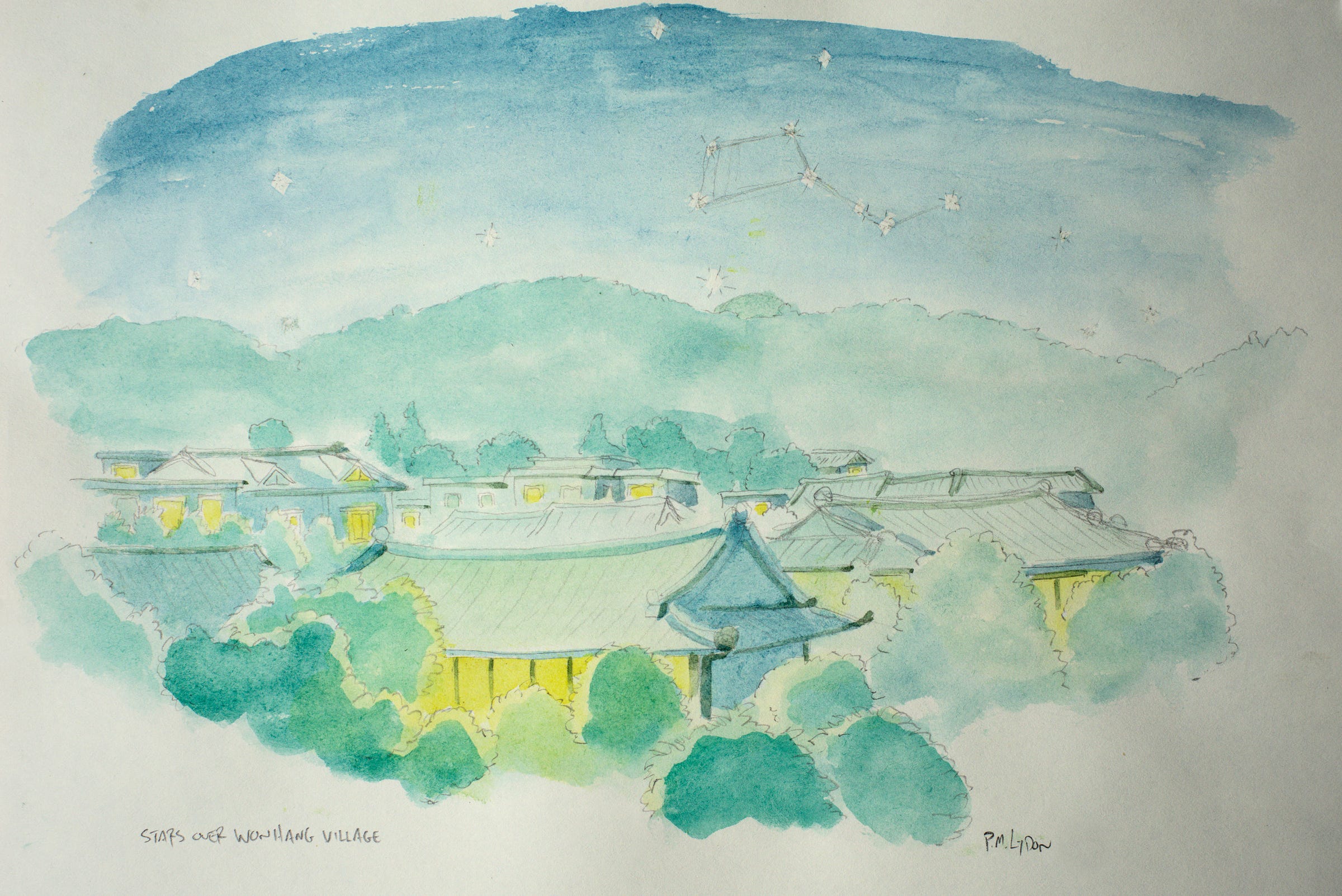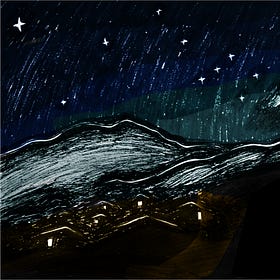My dad taught me how to find the Big Dipper. After that, I would look for it whenever the sky was clear and dark. It somehow made me feel more whole, that knowledge. I guess knowing a little thing about the cosmos can help us feel like we belong here.
Later in life, after moving to bigger, brighter cities in the world, I gained a different sense of belonging — the kind that comes when we are immersed in new social circles, in different cultures, diverse new ways of seeing.
Belonging to the world in this sense is important too. Yet in the hyper urban settings that I was living in — cities like Tokyo, Osaka, Seoul and Hong Kong — the wider sense of belonging one gets when looking into the stars was not easily available. Not in the way bestowed to me by my dad.
—
One night in particular while living in Osaka, I was up late, writing on a deadline. This writing was in a form that was new to me. The process was like pounding in a nail with a screwdriver. I had perfectly good tools and techniques, but it felt like I was being asked to use them in the wrong way. It was stressful in a way I didn’t yet know how to manage.
Needing a bit of ‘big picture’ context in this moment, I tried to think back to the last time I spotted the Big Dipper. I couldn’t. It was so long ago.
Of course it was. Rarely can you see the Big Dipper from a big city, unless there is a widespread power outage.
Frustrated, I called it quits on writing for the night.
It was very late. One knows it is very late in this neighborhood, when the last drunken worker has long since stumbled from the karaoke bar down the alley, and the big rigs that move shipping containers along the main road have not yet started their day.
This is usually the quietest time here. But this moment felt somehow quieter than quiet.
I stepped out into alley for some fresh air. It was very dark.
Normally, if one looks up into the sky between the buildings here, just above the roof line of the elementary school at the end of the street, they will see the glow of the Namba and Tennoji entertainment districts.
So I looked. But tonight, there was no such big glow.
Instead, there it was. The Big Dipper. It sparkled more clearly than I could remember.
There must have been a power outage.
Some rare kind of dark beauty.
Recently, after moving to a smaller city with darker and clearer skies, I was able to rekindle the habit of evening star watching.
Last night I walked outside to breathe in some of the night air before going to sleep. The moon was out, just a bit over half of it glowing. The Big Dipper, too, sat just above the small mountain to the northwest.
I breathe easier here. My body feels somehow lighter.
I told that to my parents when we visited over the holidays this past year, when they asked about my move to yet another new city. On that night, I was out in the backyard with my Dad, in the house I grew up in.
He was looking at the stars. I had walked out back to do the same thing.
“I look up there every night before I go to bed.” Taking his eyes from the stars, my dad then looked over at me. “Just to say hello, you know?”
I nodded. Of course, I know.
“Your mom probably thinks I’m crazy for it.” Dad laughed and looked back up to the stars.
Though he taught me to see the stars, I actually didn’t know my Dad had this evening ritual. He probably didn’t know either, that as I moved on into my adult life, I had developed the very same ritual.
Standing beside him, thinking about the night when he showed his little boy the Big Dipper, I replied.
“It’s okay Dad. If Mom thinks we’re both crazy.”
–
Cities that respect the night sky are about more than just spotting the Big Dipper. They are about allowing us to remember that we live in a cosmos, just as surely as we live in a city.
Maybe this is why my Dad looks up each night. Not just to greet the stars, but to stay in touch with something important. With the part of himself that knows it belongs to something more vast and real than the daily noise of economic and political theater.
Cheers to my Dad, and to all the dads out there.
A growing body of research shows that dark night skies benefit our sleep, our mental clarity, and the health of ecosystems around us. Many cities have begun to take this seriously.
There are now hundreds of certified International Dark Sky Places around the world — including an island in Japan that is affectionately called Tokyo’s Planetarium (Kozushima). Meanwhile in France, more than 8,000 towns and villages simply switch off their streetlights at night (Politico). City leaders are slowly coming to understand that less artificial light at night means healthier humans, and healthier habitats for all beings (DarkSky.org).
—
Questions: How do you engage with the stars? Does a dark sky city sound frightening or liberating?
Next Week: We return again to the Urban River Series, with our final episode.
Another Story: In 2019 I was in a suburb of Paris while co-producing a festival. Getting off the last train and walking home, the street lights suddenly went off. I later found out this was not a power outage, but a planned darkness…
SHORT #8: Cities in Darkness
Arriving to Yvette during the day, the city seems not so much different from the one before it, or the one after. A train station with a few shops clustered around it, a bakery, a fruit shop, homes up the side of a hill, and a small field and forest abutting a river. For this, most every town in the region can be described the same way.
Thanks for letting me into your world. Feel free to chime in below, or to introduce yourself. You can help this project grow by thinking of someone else who might like this work, and clicking the magic button below.
Not yet signed up yet to get these stories to your inbox? No problem, you can do that below. You can also join our supremely awesome club of paid subscribers who get special perks from me (like handmade block prints).








Another good one, and great painting.
Oh I'm on team starlight all the way. In fact the neighbors were perturbed with me for turning off my farm light because it was the only type of streetlight on the block (till recently). They asked if I turned it off to save money but no..it's for the night to be the night! I'm not afraid of what's in the dark! But years later I got a lil guff when my neighbor's truck was stolen. If only someone had left their light on they said! I first studied the constellations on a desert road trip and I was surprised that learning all those Greek characters in the sky (Perseus, Andromeda, Cassiopeia, Cepheus,etc.) made the sky full of friends. Suddenly the sky wasn't random anymore..it was identifiable. I tell my students it's like the difference between being friendly with someone but not knowing their name versus being friends with someone whose name you know. How can a name make such a difference? I dunno. By the way Cygnus is my favorite constellation.